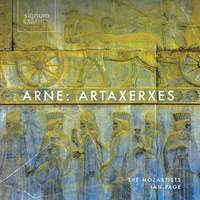Recording of the Week,
Arne: Artaxerxes
For those who think that English opera died after Purcell and was only re-born under Benjamin Britten, I’ve got a shock for you this week. Thomas Arne (best known for his patriotic song ‘Rule Britannia’) was, in the eighteenth century, a very significant opera composer. Probably his greatest opera, Artaxerxes, was premiered at the Theatre Royal (the predecessor to the Royal Opera House) in 1762 and over the following thirty years it received over one hundred performances. Mozart is likely to have attended a performance in the mid 1760s, and Haydn was so impressed by a performance in 1791 that he admitted he “had no idea we had such an opera in the English language”.

So why did it disappear from the repertoire? And why am I talking about it today?
Well, one possibility for the first question is at least partly due to a disastrous fire at the Theatre Royal in 1808 which destroyed the manuscript and all the parts. The overture, arias and duets had already been published so did survive (as well as the libretto), and from 1813 a slightly shortened version with recitatives and a finale composed by Henry Bishop were used. But general opinion seems to suggest that these were not particularly well done and could well have contributed towards its neglect from the 1830s onwards.
The reason for featuring it this week is a fabulous new recording released today by the Classical Opera Company under Ian Page. They revived the work in late 2009 in anticipation of the composer’s 300th birthday last year, and it had a hugely successful run in the Royal Opera House’s Linbury Studio. For those performances Ian Page created a new performing Edition (including re-writing all the recitatives) and Duncan Druce composed a new finale as much as possible in the style of Thomas Arne. After the success of that production they took it into the recording studio with virtually the same cast, and the results are well worth hearing.
The score is full of lovely arias and has two beautiful duets. It is richly scored for an orchestra which – fairly unusually at that time – includes clarinets. There is also a lot of imagination in the string scoring with techniques like muted cellos and pizzicato double basses also adding new colours and subtleties. The opera is built on melodic beauty more than vocal pyrotechnics, although there are still some notable ‘showy’ numbers, in particular for the roles of Arbaces (sung by Australian mezzo Caitlin Hulcup) and Mandane (sung by one of Britain’s fast-rising young sopranos, Elizabeth Watts).
Indeed, the cast are all fairly young, and it is hugely impressive. Rebecca Bottone sings a hugely spirited Semira, Christopher Ainslie is a dignified Artaxerxes (which unusually for the title role isn’t actually that big), while Andrew Staples and Daniel Norman are also in fine voice. Elizabeth Watts is the star for me though – full of passion and with breathtaking coloratura. She has a solo Bach disc out next week, and is certainly destined for big things.
The Classical Opera Company clearly enjoy Arne’s rich scoring, as well as playing for their musically sound as well as sensitive conductor Ian Page. This could be one of the discs of the year and it is only the third week of January!
Christopher Ainslie (Artaxerxes), Elizabeth Watts (Mandane), Caitlin Hulcup (Arbaces), Andrew Staples (Artabanes), Rebecca Bottone (Semira) & Daniel Norman (Rimenes), The Classical Opera Company, Ian Page (director)
Available Formats: 2 CDs, MP3, FLAC, Hi-Res FLAC, Hi-Res+ FLAC



